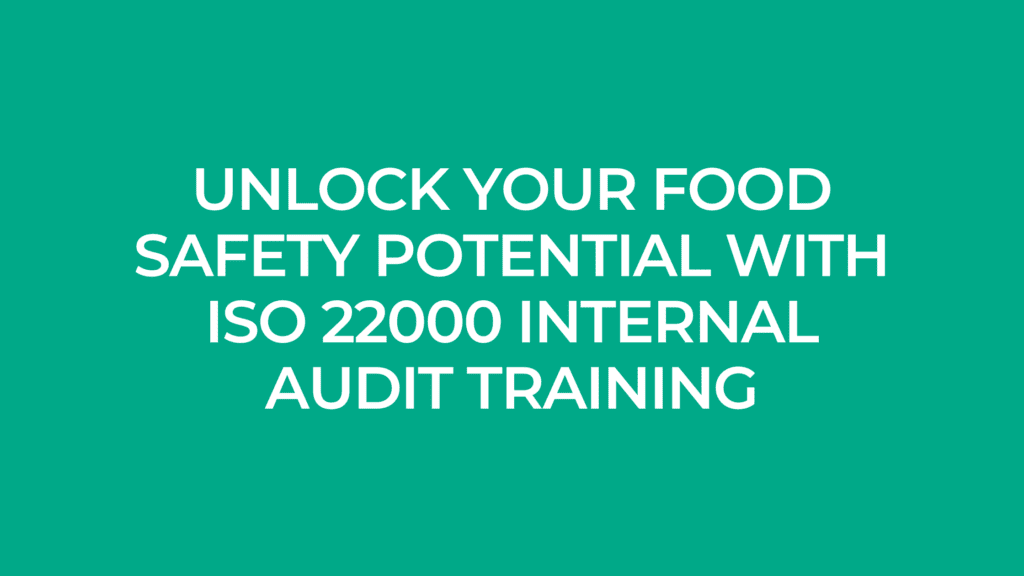ISO 22000 Internal Audit Training: Everything You Need to Know
ISO 22000 is a globally recognized standard that outlines the requirements for an effective food safety management system. To maintain compliance with the standard, organizations need to conduct regular internal audits to ensure there food safety management system is functioning effectively. This is where ISO 22000 internal audit training comes in. In this article, we'll explore the ins and outs of ISO 22000 internal audit training, including the training method, objectives, deliverables, course content, course objectives, and frequently asked questions.
1. Introduction
ISO 22000 is a widely recognized standard for food safety management systems. The standard helps organizations in the food industry ensure that their products are safe for consumption. To maintain compliance with the standard, organizations need to conduct regular internal audits. ISO 22000 internal audit training is designed to help organizations train their internal auditors to conduct effective audits.
2. What is ISO 22000 Internal Audit Training?
ISO 22000 internal audit training is a program that helps internal auditors learn how to plan, conduct, report, and follow-up on internal audits of a food safety management system. The training covers the requirements of the ISO 22000 standard and provides auditors with the skills and knowledge needed to perform effective internal audits.
3. Training Method
ISO 22000 internal audit training is typically delivered in a classroom setting, although some providers may offer online or blended learning options. The training is usually conducted by experienced trainers who are knowledgeable about the ISO 22000 standard and internal auditing.
4. Objectives of ISO 22000 Internal Audit Training
The objectives of ISO 22000 internal audit training are to:
- Understand the requirements of the ISO 22000 standard.
- Understand the principles and practices of internal auditing.
- Learn how to plan, conduct, report, and follow-up on an internal audit.
- Understand the roles and responsibilities of the internal auditor.
- Gain the skills and knowledge needed to perform effective internal audits.
- Learn how to identify and report non-conformities and opportunities for improvement.
5. Deliverables of ISO 22000 Internal Audit Training
The deliverables of ISO 22000 internal audit training include:
- A comprehensive understanding of the ISO 22000 standard and internal auditing principles and practices.
- The ability to plan, conduct, report, and follow-up on internal audits of a food safety management system.
- The ability to identify and report non-conformities and opportunities for improvement.
- The skills and knowledge needed to perform effective internal audits.
6. iso 22000 training Course Content in Detail
ISO 22000 internal audit training is typically divided into several modules, each of which covers a specific aspect of internal auditing for food safety management systems. Below is an overview of the course content in detail:
Module 1:
Introduction to ISO 22000 This module provides an overview of the ISO 22000 standard and its requirements for food safety management systems. Participants will learn about the structure of the standard and how it applies to different organizations in the food industry. The module will cover the key concepts and principles of ISO 22000, including hazard analysis, critical control points, and risk management.
Module 2:
Food Safety Management System Requirements In this module, participants will learn about the specific requirements of the ISO 22000 standard for food safety management systems. The module will cover topics such as document control, management responsibility, resource management, product realization, and measurement, analysis, and improvement. Participants will gain an understanding of how these requirements relate to the overall goal of ensuring food safety.
Module 3:
Internal Audit Requirements This module covers the requirements for internal audits of food safety management systems. Participants will learn about the purpose and benefits of internal auditing, as well as the roles and responsibilities of the internal auditor. The module will also cover the different types of internal audits, such as first-party, second-party, and third-party audits.
Module 4:
Planning and Conducting an Internal Audit This module focuses on the practical aspects of planning and conducting an internal audit of a food safety management system. Participants will learn how to develop an audit plan, including selecting audit criteria, preparing checklists, and identifying audit objectives. The module will also cover techniques for conducting interviews, observations, and document reviews during the audit process.
Module 5:
Reporting and Follow-Up The final module covers the process of reporting and following up on internal audit findings. Participants will learn how to write an effective audit report, including documenting non-conformities and opportunities for improvement. The module will also cover the importance of following up on audit findings to ensure that corrective actions are taken and the food safety management system is continually improved.
7.ISO 22000 Training course objective
The objectives of the ISO 22000 internal audit training course are to provide participants with a comprehensive understanding of the requirements of the ISO 22000 standard and the principles and practices of internal auditing. The course aims to equip participants with the skills and knowledge needed to plan, conduct, report, and follow-up on internal audits of a food safety management system.
8. FAQs about ISO 22000 Internal Audit Program
Q1. What is the duration of ISO 22000 internal audit training? The duration of ISO 22000 internal audit training can vary depending on the provider and the delivery method. Generally, the training takes between 2-5 days to complete.
Q2. Can ISO 22000 internal audit training be customized to our organization's needs? Yes, many training providers offer customized ISO 22000 internal audit training to meet the specific needs of an organization.
Q3. Do we need to have prior knowledge of the ISO 22000 standard to attend the training? While prior knowledge of the ISO 22000 standard is not required, it can be helpful. Some training providers may offer introductory courses on the standard for those who are new to it.
Q4. Is ISO 22000 internal audit training mandatory for compliance with the standard? While ISO 22000 internal audit training is not mandatory for compliance with the standard, it is recommended. Internal auditors need to have the skills and knowledge necessary to perform effective audits and identify non-conformities and opportunities for improvement.
- INTERNAL AUDITOR COURSE ON ISO 14001:2015 ENVIRONMENT MANAGEMENT SYSTEM
- CE certification
- certificate course on iso 9001:2015 quality management system
- ISO 9001 training orgramme
- iso consulting services


























































